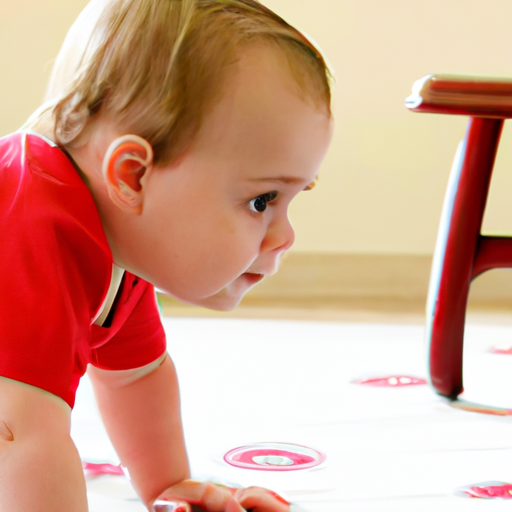Do you ever find yourself wondering if your baby is uncomfortable or ill, but you’re not quite sure how to tell? It can be a bit nerve-wracking as a parent, trying to decipher what your little one is feeling and if there’s anything you can do to help. In this article, we’ll discuss some common signs of discomfort or illness in babies, so you can feel more confident in recognizing and addressing your baby’s needs.
Curious to learn more about how to recognize signs of discomfort or illness in your baby? Stay tuned for the rest of this article, where we’ll delve into some key signs and symptoms to look out for. Whether it’s a subtle change in behavior, unusual crying, or physical symptoms, understanding these indicators can help you take better care of your baby’s health and well-being. So keep reading to gain valuable insights into recognizing signs of discomfort or illness in your little one.

Introduction
As a parent, it is natural to worry about the health and well-being of your baby. Babies are unable to express their discomfort or illness directly, which can make it challenging for parents to identify any underlying issues. However, by observing their general behavior, monitoring physical symptoms, assessing respiratory issues, identifying digestive problems, detecting ear or eye infections, recognizing injuries or bruises, analyzing behavioral changes, and knowing when to consult a healthcare professional, you can better recognize signs of discomfort or illness in your baby.
Observing General Behavior
The first step in recognizing signs of discomfort or illness in your baby is to observe their general behavior. By noting any changes in sleep patterns, unusual crying or irritability, or loss of appetite, you can gain valuable insights into their overall well-being.
Changes in sleep patterns
If your baby suddenly has trouble falling asleep or staying asleep, it could be an indication of discomfort or illness. Pay attention to any noticeable changes in their usual sleep routine, such as persistent restlessness or frequent waking up during the night.
Unusual crying or irritability
Babies cry as a means of communication, but if you notice excessive crying or irritability that cannot be easily comforted, it may be a sign that something is wrong. Trust your instincts as a parent and investigate further to determine the cause of their distress.
Loss of appetite
While babies’ appetites can fluctuate, a significant and persistent loss of appetite should not be ignored. If your baby is refusing to feed or showing disinterest in their usual meals, it may be an indication of an underlying issue that requires attention.
Monitoring Physical Symptoms
In addition to observing their general behavior, monitoring physical symptoms can also help you recognize signs of discomfort or illness in your baby. Keep an eye out for any changes in their body temperature, digestion, skin, or overall appearance.
Fever
A fever is a common symptom of various illnesses in babies. Using a reliable thermometer, check your baby’s temperature if you notice signs of discomfort or suspect they may be unwell. A rectal thermometer is the most accurate for infants.
Vomiting or diarrhea
While occasional spitting up or loose stools are normal in babies, frequent or persistent vomiting or diarrhea can be a cause for concern. Pay attention to any unusual changes in their bowel movements, as it may indicate an underlying issue.
Rashes or skin abnormalities
Babies’ skin is sensitive and prone to rashes or irritations, but if you notice any sudden or severe rashes, redness, or other abnormalities, it is important to investigate further. These symptoms could be a sign of an allergic reaction or an underlying medical condition.
Assessing Respiratory Issues
Respiratory issues can be particularly worrying for parents, as they can greatly impact a baby’s breathing and overall comfort. By keeping an eye out for certain signs, you can identify respiratory problems in your baby.
Coughing or wheezing
Persistent coughing or wheezing, especially if accompanied by difficulty breathing, can be a symptom of a respiratory infection or asthma. If you notice these symptoms, it is important to consult a healthcare professional for further evaluation and guidance.
Rapid or difficult breathing
If your baby is breathing rapidly or appears to be struggling to catch their breath, it may be a sign of respiratory distress. This can be caused by various factors, such as infections or blockages, and requires immediate medical attention.

Identifying Digestive Problems
Digestive problems are quite common in babies, but there are certain signs that can help you identify when these problems may be more serious and require medical attention.
Abdominal discomfort
Babies with digestive issues often experience abdominal discomfort. Look out for excessive crying or signs of discomfort, such as pulling their legs towards their stomach or arching their back. These can be indications of digestive problems, such as colic or constipation.
Constipation or diarrhea
Changes in bowel movements, such as prolonged constipation or frequent bouts of diarrhea, can be symptoms of underlying digestive issues in babies. If these problems persist or are accompanied by other concerning symptoms, seek medical advice.
Excessive gas
Babies naturally have more gas compared to adults, but excessive gas accompanied by discomfort or fussiness can be a sign of an underlying issue. If your baby seems particularly uncomfortable after feeding or displays excess gas-related symptoms, it may be beneficial to consult with a healthcare professional.
Detecting Ear or Eye Infections
Ear and eye infections are relatively common in babies, but they can cause significant discomfort and require medical treatment. By knowing how to recognize the signs, you can seek timely medical assistance for your baby.
Ear pulling or rubbing
If your baby is frequently pulling or rubbing their ears, it could be a sign of an ear infection. Ear infections can cause pain and discomfort, leading to this observable behavior. Check for other symptoms, such as fever or unusual ear discharge, to confirm the possibility of an infection.
Redness or discharge from eyes
Redness, excessive tearing, or discharge from the eyes can indicate an eye infection in your baby. These infections can be caused by irritants, such as dust or bacteria, and may require medical intervention to prevent further complications.
Difficulty in focusing
If you notice that your baby is having difficulty focusing or tracking objects with their eyes, it may be a sign of an eye infection or other vision-related issues. Consult with a healthcare professional to have their eyes examined and determine the underlying cause.

Recognizing Injuries or Bruises
Babies are curious explorers, but they can also be prone to accidents and injuries. It is important to be attentive and recognize any unexplained bruises, swelling, or unwillingness to move specific body parts.
Unexplained bruises or swelling
If you notice bruises or swelling on your baby’s body that cannot be attributed to accidental bumps or falls, it is crucial to investigate further. Be mindful of any unexplained injuries that could indicate physical abuse or an underlying medical condition.
Unwillingness to move specific body parts
If your baby shows reluctance or pain when moving a specific body part, it may be an indication of an injury or potential fracture. Pay attention to any limping, favoring one side, or limited mobility, and seek medical attention for a thorough evaluation.
Analyzing Behavioral Changes
Babies go through various developmental milestones, and any loss of interest in their surroundings or significant changes in behavior can signal potential discomfort or illness. Pay attention to their behavior to identify any concerning signs.
Lack of interest in surroundings
If your baby suddenly loses interest in their toys, activities, or interactions, it may be a sign of underlying discomfort or illness. Babies are naturally curious and eager to explore their environment, so a sudden change in behavior should be taken seriously.
Loss of developmental milestones
If your baby regresses or fails to reach developmental milestones they previously achieved, it may indicate something is amiss. Keep track of their progress and consult with a healthcare professional if you notice any concerning delays or regressions.
Excessive irritability
While babies can be fussy at times, excessive irritability that cannot be easily soothed may be a sign of underlying discomfort or illness. If your baby seems inconsolable or displays extreme irritability for an extended period, consider seeking medical advice.

Consulting a Healthcare Professional
While it is important to be observant and proactive in recognizing signs of discomfort or illness in your baby, consulting a healthcare professional is always advisable. They can provide accurate diagnoses, recommend suitable treatments, and address any concerns you may have as a parent.
When to seek medical help
It is crucial to know when to seek medical help for your baby. If your baby displays severe or worsening symptoms, experiences difficulty breathing, has a high fever, is unresponsive, or if your maternal instincts tell you something is seriously wrong, do not hesitate to seek immediate medical attention.
Preparing for a doctor’s visit
Before visiting a healthcare professional, ensure you have all the necessary information about your baby’s symptoms, including when they started, their frequency, and any other noticeable changes. This will help the doctor evaluate the situation more effectively.
Communicating symptoms effectively
When speaking with a healthcare professional, clearly communicate your baby’s symptoms, concerns, and any changes you have noticed in their behavior or appearance. Provide as much detail as possible to help the doctor make an accurate diagnosis.
Conclusion
Recognizing signs of discomfort or illness in your baby is crucial for their well-being. By observing their general behavior, monitoring physical symptoms, assessing respiratory issues, identifying digestive problems, detecting ear or eye infections, recognizing injuries or bruises, analyzing behavioral changes, and knowing when to consult a healthcare professional, you can be more prepared to identify signs of discomfort or illness in your baby and seek appropriate care. Trust your instincts as a parent and prioritize your baby’s health and happiness.




